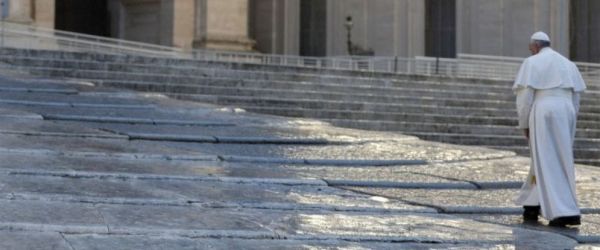Today's Gospel page proposes three parables with which Jesus speaks to the crowds about the Kingdom of God. I dwell on the first one: that of the good wheat and the weeds, which illustrates the problem of evil in the world and highlights God's patience (cf. Mt 13:24-30.36-43). How much patience God has! Each of us can also say this: "How much patience God has with me!". The story takes place in a field with two opposing protagonists. On one side is the master of the field who represents God and scatters the good seed; on the other side is the enemy who represents Satan and scatters the bad grass.
As time passes, weeds also grow in the midst of the wheat, and faced with this fact the master and his servants have different attitudes. The servants would like to intervene by tearing up the weeds; but the master, who is concerned above all for the salvation of the wheat, opposes this, saying: "Let it not happen that, in gathering up the weeds, you also uproot the wheat with it" (v. 29). With this image, Jesus tells us that in this world good and evil are so intertwined that it is impossible to separate them and uproot all evil. Only God can do this, and he will do it in the final judgement. With its ambiguities and its composite character, the present situation is the field of freedom, the field of Christian freedom, in which the difficult exercise of discernment between good and evil is carried out.
And in this field it is therefore a matter of combining, with great trust in God and his providence, two apparently contradictory attitudes: decision and patience. The decision is to want to be good wheat - we all do -, with all our strength, and therefore to distance ourselves from the evil one and its seductions. Patience means preferring a Church that is leavened in the dough, that is not afraid to get its hands dirty washing its children's clothes, rather than a Church of the 'pure', that claims to judge before time who is in the Kingdom of God and who is not.
The Lord, who is Wisdom incarnate, today helps us to understand that good and evil cannot be identified with defined territories or specific human groups: "These are the good, these are the bad". He tells us that the line between good and evil passes through the heart of each person, passes through the heart of each one of us, that is: We are all sinners. It makes me want to ask: "Who is not a sinner, raise your hand". No one! Because we all are, we are all sinners. Jesus Christ, by his death on the cross and his resurrection, freed us from the bondage of sin and gives us the grace to walk in a new life; but with Baptism he also gave us Confession, because we always need to be forgiven of our sins. To always and only look at the evil outside of us is to not want to recognise the sin that is also within us.
And then Jesus teaches us a different way of looking at the field of the world, of observing reality. We are called to learn God's times - which are not our times - and also God's 'gaze': thanks to the beneficial influence of an eager expectation, what was darnel or seemed to be darnel can become a good product. This is the reality of conversion. It is the perspective of hope!
May the Virgin Mary help us to grasp in the reality that surrounds us not only the dirt and the evil, but also the good and the beautiful; to unmask the work of Satan, but above all to trust in God's action that makes history fruitful".
[Pope Francis, Angelus 23 July 2017]












